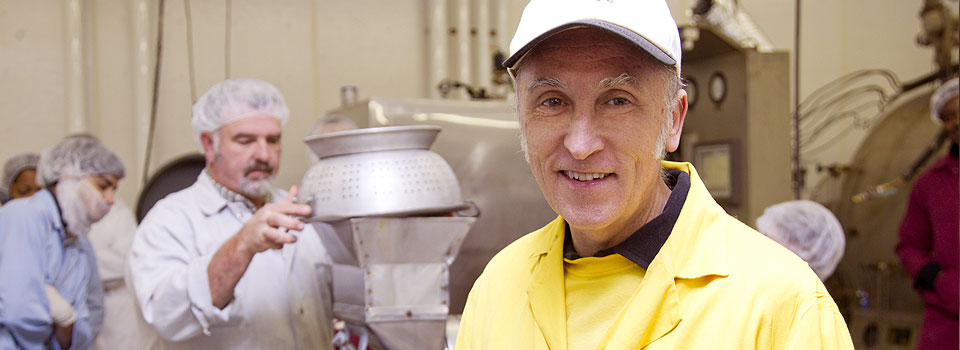Rob Shewfelt, Josiah Meigs Distinguished Teaching Professor of Food Science and Technology, wants his students to be able to apply class concepts to real-world situations in the food industry.
Where did you earn degrees and what are your current responsibilities at UGA?
I earned my B.S. degree at Clemson University in 1971, my M.S. degree at the University of Florida in 1977 and my Ph.D. at the University of Massachusetts in 1982. I am currently a professor with a 70 percent teaching appointment typically teaching nine hours each fall and spring. I serve as the undergraduate coordinator for the department of food science and technology. In my research life, I am currently working on three funded projects involving sensory quality of fresh blueberries and sweet onions, as well as training the trainers of fresh fruit and vegetable professionals in sub-Saharan Africa. I am currently the major professor of six graduate students.
When did you come to UGA and what brought you here?
I came to UGA’s Griffin campus in January 1982 in a 100 percent research position. I was much more confident in my ability to teach than my ability to do research and believed that I could be more successful in my career if I focused on research before I started teaching. I was attracted by the opportunity to participate in a postharvest team focusing on tracing quality changes in fruits and vegetables from farm to consumer. The position had been defined to fit into an interdisciplinary emphasis at the experiment station in Griffin on horticultural crops.
What are your favorite courses and why?
Although I am best known for my First-Year seminar, Chocolate Science, my favorite course is Food Processing. Everything we do in food science – from keeping foods safe, preventing spoilage, maintaining nutritional and sensory quality, and developing new products – comes back to an understanding of food processes. I teach the laboratory of the class as a virtual food company that selects, develops and manufactures four distinctly different food products. The lab experience forces students to get away from a multiple-choice test mentality to thinking how they can apply concepts in the class to real-world situations.
What interests you about your field?
All my students eat, usually several times a day. There are many myths and misunderstandings about the foods we eat. I am never short of examples of the concepts I cover in my classes. I try to discredit several of these myths in class, not by being too dogmatic but to get students to think critically about the foods they choose to eat and the importance of using data-driven evidence rather than conventional wisdom to guide their thoughts.
What are some highlights of your career at UGA?
In 1992, I had the opportunity to spend six months in Australia at the University of Western Sydney, Hawkesbury, studying the chemical composition of melons as it affects flavor. It was a great opportunity to learn some new technical skills, as well as to gain insights into the Australian culture. Dr. Bernhard Bruekner and I organized a Postharvest Systems Research Conference in Potsdam, Germany in 1997 that spawned subsequent conferences back here in Georgia, the Netherlands and Thailand. My research also allowed me to visit Israel, England, Portugal and Belgium. I treasure most the opportunity that allowed me to move to the Athens campus to teach and work as the undergraduate recruiter for the Food Science major in 1996.
How does your research or scholarship inspire your teaching?
My first department head, Dr. Tommy Nakayama, told me that my teaching would benefit from my early focus on research because I would be teaching from experience rather than from a book. I am probably most effective in the classroom when using stories from that background, mostly true, to illustrate points I am trying to make.
What do you hope students gain from their classroom experience with you?
I try to get into the students minds and get them to think. I hope that they will be better able to use their brains to evaluate the world around them with particular respect to food and food habits.
Describe your ideal student.
My ideal student is one who is more interested in gaining knowledge than in getting a good grade. The ideal student challenges my thinking and comes up with a better-reasoned argument than I have formulated.
Favorite place to be on campus is…
…in the classroom engaging students in discussion, including the discussion group I participate in weekly on North Campus that has nothing to do with food.
Beyond the UGA campus, I like to…
…spend quality time with my wife and dog; read about politics, American history, science and economics; and listen to my XM radio about politics, sports and old-time dramas.
Community/civic involvement includes….
…attending church and little else. I plan to be more active in my community when I retire.
Favorite book/movie?
Choosing a favorite book is like choosing a favorite student! I have read so many great books and interacted with so many great students! The best two books I have read recently are In the Age of Abundance: How Prosperity Transformed America’s Politics and Culture by Brink Lindsey and Trucking Country: The Road to America’s Wal-Mart Economy by Shane Hamilton in our history department. As far as movies go, I am currently enjoying the West Wing series on disc and found Manufactured Landscapes to be quite thought-provoking.
Proudest moment at UGA?
Any time a former student comes back to campus and talks about what they have done in the real world, particularly when they tell me about something they learned in class that helped them with their job responsibilities.
Other pertinent information you wish to share.
The best thing about my job is the opportunity to interact with students. They inspire me to work harder and be better prepared.
